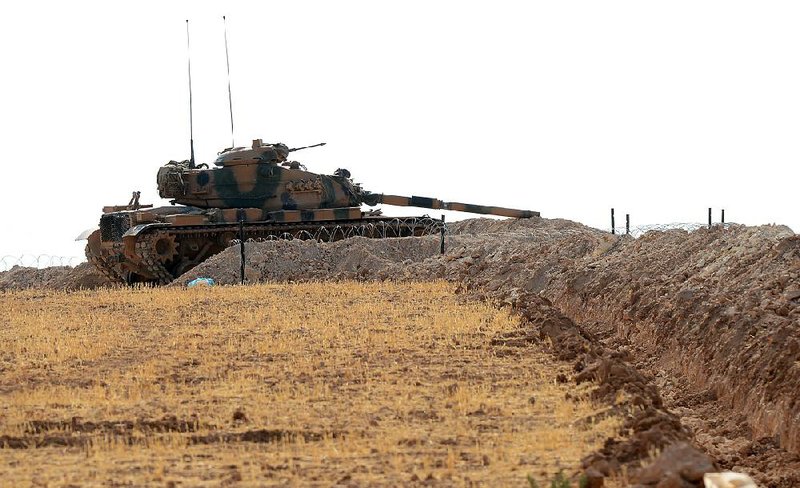ANKARA, Turkey -- The United States on Monday urged Turkish troops and Kurdish forces in northern Syria to halt their fighting, saying it hinders efforts to defeat the Islamic State militant group. But Turkey's president vowed to press ahead with the military operation until the Islamic State and Kurdish Syrian fighters no longer pose a security threat to Ankara.
It was the first U.S. criticism of its NATO ally since it began a U.S.-backed incursion into northern Syria to help Syrian rebels seize the town of Jarablus from the Islamic State. They have been clashing with Kurdish Syrian forces around the town to try to halt their advance.
The battle now pits Turkey against the Kurdish-led force known as the Syria Democratic Forces-- a U.S.-backed proxy that is the most effective ground force battling Islamic State militants in Syria's 5-year-old civil war. It puts Washington in the difficult spot of having to choose between two allies, and officials fear it will divert resources from the fight against the Islamic State.
U.S. Defense Secretary Ashton Carter said Washington has asked Turkey to "stay focused" on the fight against the Islamic State and not to engage with the Syria Democratic Forces.
"We've called on both sides not to fight one another, not to fight each other," Carter said.
He told reporters at the Pentagon that Gen. Joseph Dunford, chairman of the Joint Chiefs of Staff, spoke to his Turkish counterpart Sunday. Carter added that he intends to discuss the issue next week in Europe with Turkish Defense Minister Fikri Isik.
Pentagon press secretary Peter Cook said the clashes were of "deep concern," adding that they were not coordinated with U.S. forces, "and we do not support them."
"Uncoordinated operations and maneuvers only provide room for ISIL to find sanctuary and continue planning attacks against Turkey, the SDF, the United States, and our partners around the world," the statement said, using acronyms to refer to the Islamic State and to the Syria Democratic Forces.
Turkish officials responded by insisting that Kurdish forces "immediately" withdraw east of the Euphrates River or face more attacks by Turkish forces.
"No one has the right to tell Turkey to 'fight this terror organization but don't fight that terror organization,'" said Omer Celik, a Turkish cabinet minister.
Turkey's Hurriyet newspaper, in an online edition, quoted Deputy Prime Minister Numan Kurtulmus as responding to the Pentagon by saying the U.S. should keep to its promise and use its influence to press its Kurdish allies to withdraw to the east.
The sharp rhetoric -- and the continued fighting -- reflects the complicated and conflicting interests at stake in northern Syria after Turkish tanks rolled across the border Wednesday with the dual aim of containing the Islamic State and Kurdish forces.
The U.S. has supported Turkey in its demand that the Syria Democratic Forces withdraw east of the Euphrates, which cuts into Jarablus. The goal is to clear the region south of Jarablus of Kurdish forces, thus keeping them from linking with other Kurdish-controlled areas in Afrin in Syria's northwestern corner.
Turkey pressed ahead with its offensive, seemingly bent on creating a de facto "safe zone" free of the Islamic State and the Kurds near its border. The Turkish military said Turkey-backed Syrian rebels -- a mix of various Islamist rebel factions -- have cleared 10 more villages of "terrorist entities" and now control of an area totaling about 150 square miles south and west of Jarablus.
In an emailed statement, Turkish military officials said Syrian opposition forces were continuing their operations to clear Islamic State-controlled areas.
Syrian opposition groups, meanwhile, reported that Turkish-backed Syrian rebels have captured more towns and villages as part of the operation named "Euphrates Shield," now in its sixth day.
Cook said the U.S. doesn't support reported Turkish airstrikes and artillery shelling of U.S.-backed Syrian Kurdish fighters -- or Kurdish attacks on Turkish troops -- in areas where Islamic State fighters no longer operate.
In another sign of brewing discord, Cook said the Kurdish pullback to the east side of the Euphrates has "largely occurred."
Syrian opposition activists have said at least 35 civilians were killed in northern Syria in the Turkish-led operation so far. Turkey denied any civilians had been hit. A Turkish soldier was killed Saturday by a Kurdish rocket attack, the first such fatality in Turkey's ground offensive.
The Britain-based Syrian Observatory for Human Rights said the Turkey-backed rebels have captured 21 towns and villages near Jarablus from the Kurdish-dominated Syria Democratic Forces.
The Observatory also reported clashes between rebels and Islamic State fighters on the western edge of Jarablus. The Local Coordination Committees, an activist collective, said the rebels captured seven more villages since late Sunday.
Turkish artillery fired 61 rounds against 20 "terrorist" targets in and around Jarablus in the past 24 hours, Turkey's state-run Anadolu Agency reported.
Information for this article was contributed by Bassem Mroue and Robert Burns of The Associated Press.
A Section on 08/30/2016

